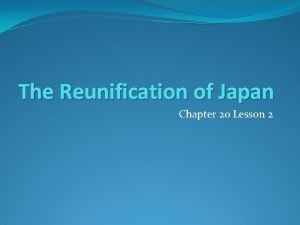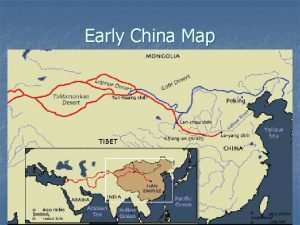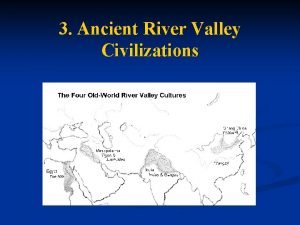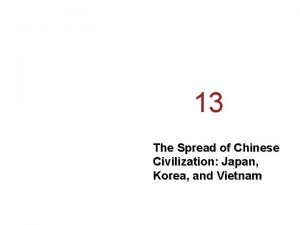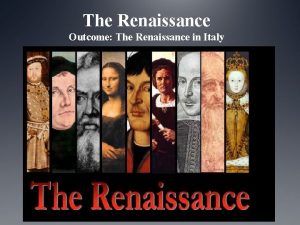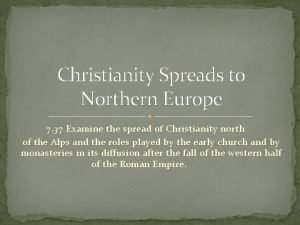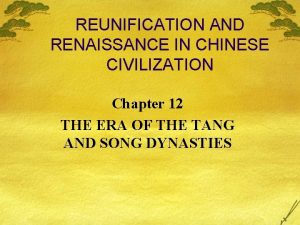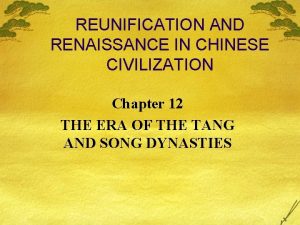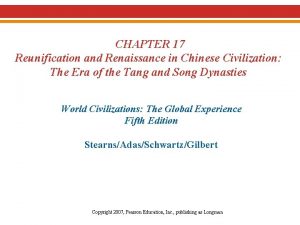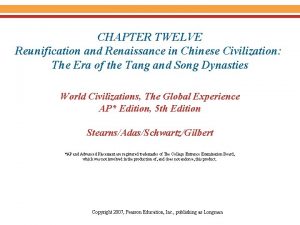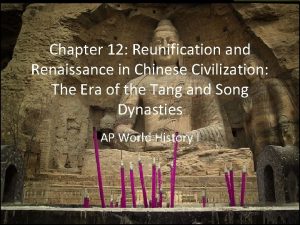Chapter 12 REUNIFICATION AND RENAISSANCE IN CHINESE CIVILIZATION









- Slides: 9

Chapter 12 REUNIFICATION AND RENAISSANCE IN CHINESE CIVILIZATION: THE ERA OF THE TANG AND SONG DYNASTIES| APCIV

Rebuilding the Imperial Edifice in the Sui-Tang Era Wendi, a Chinese aristocrat, would marry into the Zhou dynasty and eventually unite China, ending 300 years of war in 589 CE He would become popular by lowering taxes and establishing granaries throughout China He would be murdered by his son, Yangdi, who would drive off nomads in the north of China and return Confucianism to the bureaucracy Yangdi would force peasants to build a new city, uproot trees for a hunting forest, and fail at reconquering Korea This would lead to a series of revolts against his rule One of his top officers, Li Yuan and his second son would overthrow their crazed leader Li Yuan would abdicate for his son to rule Tang Taizong The Tang Resurgence c. 630 CE Would conquer deep into Central Asia (Afghanistan) Repaired the Great Wall and incorporated Turkic peoples into the Chinese fold (Uighurs) Would bring Turks to the court in China, where they would be educated The Tang would conquer Manchuria and vassalize Korea

Adjusting to Change Tang efforts on stability went into the bureaucracy Revived the scholar-gentry of the Han Dynasty and the civil service exam The system was streamlined from top to sub prefecture (equivalent of an American county) The Ministry of Rites administered various exams to distinguished students The best jobs were those where philosophy, law, and literature were tested Students who passed the most challenging courses were given the title jinshi and were praised across the empire: their families would promote along with the student Exams literally promoted entire families to new levels of society, with new rights State and religion in the Tang and Song eras Buddhism grew in popularity during the turmoil after the Han collapsed The Tang used it as a means to unify the Chinese again, and gave it patronage Buddhism would get more spiritual as it traveled eastward (Japanese Chan – Zen – being the most) Empress Wu (r. 690 -705) would be Buddhism’s greatest patron (attempting to make it state religion) Commissioned various Buddhist statues to be made; by mid-9 th cen. , nearly 50, 000 Buddhist temples By c. 10 th century, backlash from Dao/Con-ists and tax avoidance led to the destruction of many Buddhist sites Their land wealth would be re-distributed to the poorer taxpayers

Tang Decline and Song Ascension The first century and a half of Tang rule produced brilliant leaders The last of Tang emperors would lose power to decentralization and internal feuds Landed elite would eventually stop paying taxes and claim independence: revolts/war 907 CE the last Tang emperor steps down: political division, social strife, and nomadic dominance 960 CE one general emerged and unified China: the Song Dynasty was born The Song Dynasty was unable to conquer the northern nomadic peoples These peoples slowly became Sinified: Liao Dynasty They were militarily superior, culturally inferior: forced the Song to pay heavy tribute The tribute was a great burden on the Song, coupled with the 1 million man army to guard the borders (a testament to the unmatched power of Chinese civilization compared to other civilizations) the economy strained – Liao success drew other nomads to China Song thought revived Confucianism in light of Buddhist decline Neo-Confucianism focused on personal morality and good nature as goal for all They were, however, conservative, fighting efforts to reform the state through active leadership

AS MORE TURKIC/MONGOL NOMADS MOVED INTO THE NORTH, OVERTHROWING THE LIAO, THE SONG WERE PUSHED FURTHER SOUTH Day 2 THE SOUTHERN SONG (1167 -1279) WOULD BE A RUMP OF A STATE COMPARED TO PRIOR DYNASTIES, BUT WOULD BRING ABOUT THE MOST GLORIOUS PERIODS IN CHINESE HISTORY – POSSIBLY IN HUMAN HISTORY

Tang and Song Prosperity The Grand Canal: a massive project to united the 2 major economic and social sectors of China (north and south) Facilitated movement of peoples and goods from E/W/N/S: waterways Nearly 1200 miles long, 40 paces wide, and lined with highways on each side Chinese junks were the best ships in the world at the time (some were astounding in size) Dominated trade in the Asian seas down to the Malay peninsula Merchant guilds and city markets developed on a huge scale (Tang switched to paper money: demand) To reduce robbery along the Silk Road, China developed “flying money”, which were vouchers that could be cashed in at the destination for currency Cities grew at an unparalleled rate with urban populations on a scale not seen until the industrial revolution: Changan’s population was 2 million Advancements in irrigation (state sponsored), technology (wheelbarrow, et cetera), and better rice (Champa rice from Vietnam) all increased production and efficiency Sui, Tang, and Song dynasties worked to break up powerful aristocracies Distributed land more equitably among free peasants and encouraged advancement Increased population of happy and prosperous farmers and ended threats from aristocratic wars Chinese women also gained rights under the Tang (this reversed under the Song) Wealthy women could take on second lovers (complementary husbands) and were protected from capricious decisions of husbands

The advancement of women during the Tang would be overshadowed by their worsening status Neo-Confucianism and reassertion of male dominance Slowly, women would be reduced to the household, with an emphasis on childrearing and submissiveness This would mimic trends in India, Christianity, and Islam – all of which had a culture of subjugating women Women were taught that virginity before marriage was virtuous, and after marriage celibacy was virtuous Chinese female foot-binding: permanently crippled women and allowed for male domination, as they were unable to walk far or engage in other occupations

A Golden Age of Invention and Artistic Creativity Scientific, technological, and artistic breakthroughs during these dynasties outclassed all other human civilization of the time The art and literature from this time is some of the most splendid in all of human history The invention of paper accelerated economic growth (also, printing press) Engineering feats like the Grand Canal rival the Great Wall itself Arched and suspension bridges covered the landscape Explosive powder may be the most enduring invention Used as fireworks, communication, and war (these were used to check, but could not stop nomadic incursions in the end) Song naval vessels were equipped with flamethrowers, rockets, poisonous gasses, and more These vessels greatly outmatched all other navies in size and power Domestic inventions included a culture of tea, the advent of the kite, cotton clothing, and the use of coal to heat homes (more Tang than Song inventions) The growth of the scholarly-gentry class led to a flowering of art and literature This culture was spread through education, which favored an educated class of generalists, rather than what would develop in the West: a limited group of specialists Much of the art and poetry from the time came from well-educated amateurs as hobbyists as opposed to brilliant individuals

China and the World Economy Politics The Mongols Until the 18 th century, China would remain the world’s most powerful, sophisticated, and accomplished economy on Earth Until the 18 th century, Chinese dynasties would wield the most political power of any civilization on Earth Song China retreated to the south to avoid the most powerful military force on Earth, the Mongols Its inventions would greatly influence the rest of humanity It would pay off the Mongol Empire until Kublai Khan overran the Song in 1279
